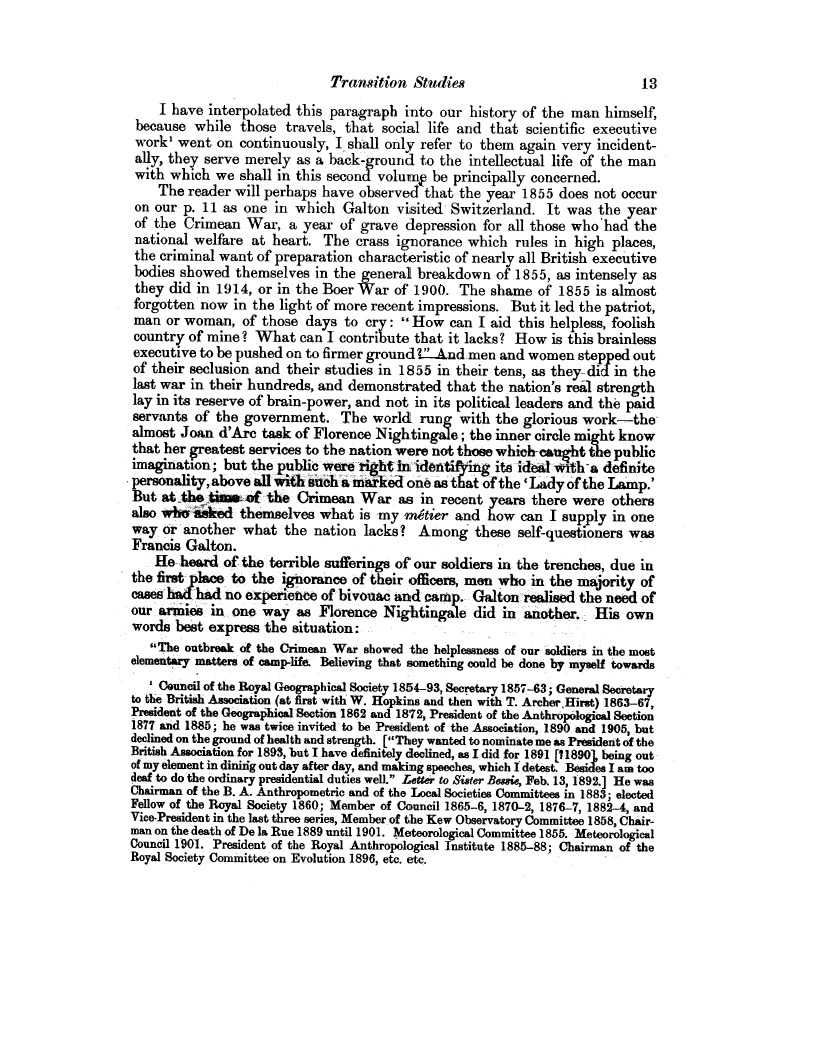Transition Studies 13
I have interpolated this paragraph into our history of the man himself, because while those travels, that social life and that scientific executive work' went on continuously, I, shall only refer to them again very incidentally, they serve merely as a back-ground to the intellectual life of the man with which we shall in this second volume be principally concerned.
The reader will perhaps have observed that the year 1855 does not occur on our p. 11 as one in which Galton visited Switzerland. It was the year of the Crimean War, a year of grave depression for all those who'had the national welfare at heart. The crass ignorance which rules in high places, the criminal want of preparation characteristic of nearly all British executive bodies showed themselves in the general breakdown of 1855, as intensely as they did in 1914, or in the Boer War of 1900. The shame of 1855 is almost forgotten now in the light of more recent impressions. But it led the patriot, man or woman, of those days to cry : "How can I aid this helpless, foolish country of mine? What can I contribute that it lacks? How is this brainless executive to be pushed on to firmer ground M.Lndmen and women stepped out of their seclusion and their studies in 1855 in their tens, as they-did in the last war in their hundreds, and demonstrated that the nation's real strength lay in its reserve of brain-power, and not in its political leaders and the paid servants of the government. The world rung with the glorious work-thealmost Joan d'Arc task of Florence Nightingale ; the inner circle might know that her greatest services to the nation were not those which-caught the public imagination; but the public were right in idezt i its ideal with- a definite personality, above all with such a marked one as that of the, Lady of the Lamp.' But at _the titres- of the Crimean War as in recent years there were others also who asked themselves what is my metier and how can I supply in one way or another what the nation lacks? Among these self-questioners was Francis Galton.
He-heard of the terrible sufferings of our soldiers in the trenches, due in the first place to the ignorance of their officers, men who in the majority of
had. had no experience of bivouac and cam Galton realised the need of our armies inn one way as Florence Nightie e did in another. His own words best express the situation
"The outbreak of the Crimean War showed the helplessness of our soldiers in the most elementary matters of camp-life. Believing that something could be done by myself towards
` Council of the Royal Geographical Society 1854-93, Secretary 1857-63; General Secretary to the British Association (at first with W. Hopkins and then with T. Archer Hirat)1863-67, President of the Geographical Section 1862 and 1872, President of the Anthropological Section 1877 and 1885; he was twice invited to be President of the Association, 1890 and 1905, but declined on the ground of health and strength. ["They wanted to nominate me as President of the British Association for 1893, but I have definitely declined, as I did for 1891 [118901 being out of my element in dining out day after day, and making speeches, which I detest. Besies I am too deaf to do the ordinary presidential duties well." Letter to Sister Bessie, Feb. 13, 1892.] He was Chairman of the B. A. Anthropometric and of the Local Societies Committees in 1883; elected Fellow of the Royal Society 1860; Member of Council 1865-6, 1870-2, 1876-7, 1882-4, and Vice-President in the last three series, Member of the Kew Observatory Committee 1858, Chairman on the death of De is Rue 1889 until 1901. Meteorological Committee 1855. Meteorological Council 1901. President of the Royal Anthropological Institute 1885-88; Chairman of the Royal Society Committee on Evolution 1896, etc. etc.

